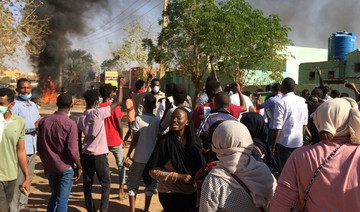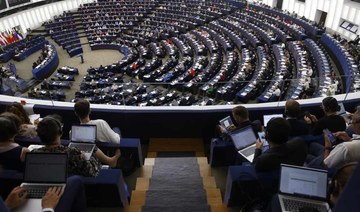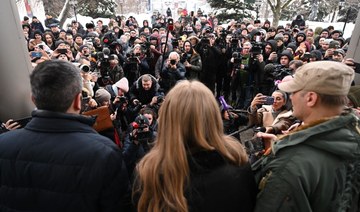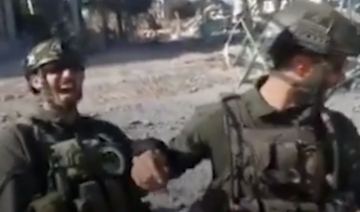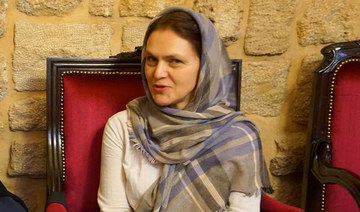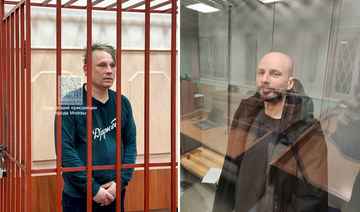CAIRO: Despite a long-standing crackdown on dissent in Sudan, opponents of President Omar Al-Bashir have found a voice online, using social media to fuel nationwide protests and share images of security forces using violence to suppress them.
The protests in Sudan began peacefully on December 19 to demonstrate against the tripling of the price of bread.
But they have evolved into deadly confrontations between demonstrators and security forces, and triggered calls for the downfall of the country’s veteran ruler.
“Social media is crucial for the movement,” said one 24-year-old activist, speaking with AFP in Cairo over WhatsApp. AFP has withheld his name for safety reasons.
For the past four weeks, activists have actively documented the confrontations and flooded social media with footage which they claim is “exposing” Bashir’s government.
The main cities of the northeast African nation, including the capital Khartoum and its twin city Omdurman, have all been rocked by what is now widely seen as the biggest threat to Bashir in his three decades of iron-fisted rule.
The 24-year-old protester said he only finds out about demonstrations through online announcements and maintained that anger at the “horrible” videos of deadly confrontations was driving more people out onto the streets.
One video purportedly showed a security vehicle chasing protesters to run them over, while gunshots were heard in the background.
Another clip showed people rushing to try to remove the blood-covered body of a protester hit by gunfire. Both have been viewed hundreds of times online.
Authorities say at least 24 people have died in the clashes, but rights groups including Amnesty International have put the death toll at 40 and say more than 1,000 people have been arrested.
On Friday during prayers at a mosque, irate crowds appeared in a video calling on an imam to lead protests against Bashir.
None of the footage could be independently verified by AFP.
Users have also shared multiple images of what appears to be security personnel beating up protesters with batons.
“We are people who don’t accept injustice. And what happened to protesters, whether it was tear gas or live bullets fired at them, is clear injustice,” said another social media activist based in Khartoum, who also spoke to AFP in Cairo and declined to be named fearing reprisals.
“Protests where violations occur are usually followed by larger ones,” the 25-year-old added.
The demonstrations have been spearheaded by the Sudanese Professionals’ Association (SPA) which regularly issues online announcements of upcoming rallies, with the hashtags #Sudan_cities_uprise or #Just_Fall.
Other hashtags such as #SudanRevolts and #SudanUprising have also helped build momentum, amassing hundreds of tweets and retweets by the hour.
Thanks to social media “the uprisings in the regional cities have been noticed a lot more quickly,” said Willow Berridge, a lecturer at Newcastle University in northern England.
And that “has had an impact on what is happening in Khartoum a lot more quickly because of the changing nature of technology and social media.”
With the protests showing no signs of abating, the Sudanese government has sought to curtail the use of social networks, activists and analysts said.
Internet users have reported difficulties accessing platforms such as Facebook, Twitter and WhatsApp since the early days of the protests.
It is not an unusual tactic by autocratic governments.
In the turbulent days of Egypt’s 2011 uprising against long-serving ruler Hosni Mubarak, the government blocked communications and cut off nearly all Internet traffic.
Such experiences prompted Sudanese activists to immediately look for alternatives for online access, including the use of virtual private network (VPN) services to bypass controls.
“Shutting down access to online platforms has proved a farce,” said Magdi El Gizouli, a Sudan analyst with the Rift Valley Institute.
“Almost immediately, the bulk of Sudanese Internet users were online through VPN,” he added.
And activists saw the Sudanese government’s heavy-handed move as virtually ineffective.
“It gave people an indication that the government is scared,” said the 25-year-old activist.
“This only strengthened the spirit of revolt in people, as it showed that we are on the right track.”
The 24-year-old also believes the restrictions on online media are “pointless” and have “little to no impact over the demonstrations.”
The government has in past years already moved to curtail online and print media.
And Sudan already has ranked 174 out of 180 on the World Press Freedom index for consecutive years from 2015 to 2018.
In 2018, the country introduced a cybercrime law and amendments to the media law that rights groups see as aiming to tighten online restrictions.
According to a November report by the US-based think tank Freedom House, at least one person has been jailed “for critical commentary shared on social media” in Sudan, and authorities have arrested “numerous journalists and activists for alleged cybercrime.”
But Gizouli says the government’s attempts to crush online dissent have been “to no avail.”
“In many ways, these measures have only reinforced public anger at the government’s securitization of the Internet,” he said.
Social media aids Sudan opposition to spread protests
Social media aids Sudan opposition to spread protests

- Activists have actively documented the confrontations and flooded social media with footage which they claim is “exposing” Bashir’s government
- Other hashtags such as #SudanRevolts and #SudanUprising have also helped build momentum, amassing hundreds of tweets and retweets by the hour
EU bans 4 more Russian media outlets from broadcasting in the bloc, citing disinformation

- The EU has already suspended Russia Today and Sputnik among several other outlets since February 2022
BRUSSELS: The European Union on Friday banned four more Russian media outlets from broadcasting in the 27-nation bloc for what it calls the spread of propaganda about the invasion of Ukraine and disinformation as the EU heads into parliamentary elections in three weeks.
The latest batch of broadcasters consists of Voice of Europe, RIA Novosti, Izvestia and Rossiyskaya Gazeta, which the EU claims are all under control of the Kremlin. It said in a statement that the four are in particular targeting “European political parties, especially during election periods.”
Belgium already last month opened an investigation into suspected Russian interference in June’s Europe-wide elections, saying its country’s intelligence service has confirmed the existence of a network trying to undermine support for Ukraine.
The Czech government has imposed sanctions on a number of people after a pro-Russian influence operation was uncovered there. They are alleged to have approached members of the European Parliament and offered them money to promote Russian propaganda.
Since the war started in February 2022, the EU has already suspended Russia Today and Sputnik among several other outlets.
Israeli soldiers post abusive videos despite army’s pledge to act: BBC analysis

- The BBC analyzed 45 photos and videos posted online by Israeli soldiers that showed Palestinian prisoners in the West Bank being abused and humiliated
LONDON: Israeli soldiers continue to post videos of abuse against Palestinian detainees despite a military pledge to take action against the perpetrators, analysis by the BBC has found.
The broadcaster said it had analyzed 45 photos and videos posted online by Israeli soldiers that showed Palestinian prisoners in the West Bank being abused and humiliated. Some were draped in Israeli flags.
Experts say the footage and images, which showed Palestinians being stripped, beaten and blindfolded, could breach international law and amount to a war crime.
The Israel Defense Forces said some soldiers had been disciplined or suspended for “unacceptable behavior” but did not comment on the individual cases identified by the BBC.
The most recent investigation into social media misconduct by Israeli soldiers follows a previous inquiry in which BBC Verify confirmed Israeli soldiers had filmed Gazan detainees while beating them and then posted the material on social platforms.
The Israeli military has carried out arbitrary arrests across Gaza and the West Bank, including East Jerusalem, since the Hamas attack on Oct. 7. The number of Palestinian prisoners in the West Bank has since risen to more than 7,060 according to the Commission of Detainees’ Affairs and the Palestinian Prisoner Society.
Ori Givati, spokesperson for Breaking the Silence, a non-governmental organization for Israeli veterans working to expose wrongdoing in the IDF, told the BBC he was “far from shocked” to hear the misconduct was ongoing.
Blaming “current far-right political rhetoric in the country” for further encouraging the abuse, he added: “There are no repercussions. They [Israeli soldiers] get encouraged and supported by the highest ministers of the government.”
He said this played into a mindset already subscribed to by the military: “The culture in the military, when it comes to Palestinians, is that they are only targets. They are not human beings. This is how the military teaches you to behave.”
The BBC’s analysis found that the videos and photos it examined were posted by 11 soldiers of the Kfir Brigade, the largest infantry brigade in the IDF. None of them hid their identity.
The IDF did not respond when the BBC asked about the actions of the individual soldiers and whether they had been disciplined.
The BBC also attempted to contact the soldiers on social media. The organization was blocked by one, while none of the others responded.
Mark Ellis, executive director of the International Bar Association, urged an investigation into the incidents shown in the footage and called for the IDF to discipline those involved.
In response to the BBC’s investigation, the IDF said: “The IDF holds its soldiers to a professional standard … and investigates when behavior is not in line with the IDF’s values. In the event of unacceptable behavior, soldiers were disciplined and even suspended from reserve duty.
“Additionally, soldiers are instructed to avoid uploading footage of operational activities to social media networks.”
However, it did not acknowledge its pledge to act on BBC Verify’s earlier findings in Gaza, according to the broadcaster.
4 journalists killed in Gaza as death toll climbs above 100

- 104 Palestinian media workers reported dead, along with 3 Lebanese and 2 Israelis
LONDON: The Gaza Media Authority on Thursday said that four journalists had been killed in an Israeli airstrike, bringing the total number of journalists killed in the conflict to more than 100.
The victims were identified as Hail Al-Najjar, a video editor at the Al-Aqsa Media Network; Mahmoud Jahjouh, a photojournalist at the Palestine Post website; Moath Mustafa Al-Ghefari, a photojournalist at the Kanaan Land website and Palestinian Media Foundation; and Amina Mahmoud Hameed, a program presenter and editor at several media outlets, according to the Anadolu Agency.
The Gaza Media Office said the four were killed in an Israeli airstrike, but did not provide additional details on the circumstances surrounding their deaths.
A total of 104 Palestinian journalists have been killed since the conflict began on Oct. 7. Two Israeli and three Lebanese media workers also have been killed.
The latest loss adds to the already heavy toll on media workers, with the Committee to Protect Journalists saying the Gaza conflict is the deadliest for journalists and media workers since it began keeping records.
Israel is continuing its offensive on Gaza despite a UN Security Council resolution demanding an immediate ceasefire.
On Thursday, South Africa, which has brought a case accusing Israel of genocide to the International Court of Justice, urged the court to order Israel to halt its assault on Rafah.
According to Gaza medical authorities, more than 35,200 Palestinians have been killed, mostly women and children, and over 79,200 have been injured since early October when Israel launched its offensive following an attack by Hamas.
Russia outlaws SOTA opposition news outlet

- Authorities said outlet tries to destabilize the socio-political situation in Russia
- Move could criminalize SOTA content and puts its reporters at risk of arrest
LONDON: Russia declared opposition media outlet SOTA “undesirable” on Thursday, a move that could criminalize the sharing of its content and put its reporters at risk of arrest.
Authorities in Russia have declared dozens of news outlets, think tanks and non-profit organizations “undesirable” since 2015, a label rights groups say is designed to deter dissent.
In a statement, Russia’s Prosecutor General accused SOTA of “frank attempts to destabilize the socio-political situation in Russia” and “create tension and irritation in society.”
“Such activities, obviously encouraged by so-called Western inspirers, have the goal of undermining the spiritual and moral foundations of Russian society,” it said.
It also accused SOTA of co-operating with TV Rain and The Insider, two other independent Russian-language outlets based outside of the country that are linked to the opposition.
SOTA Project, which covers opposition protests and has been fiercely critical of the Kremlin, denied it had anything to do with TV Rain and The Insider and rejected the claims.
But it advised its followers in Russia to “remove reposts and links” to its materials to avoid the risk of prosecution. SOTA’s Telegram channel has around 137,000 subscribers.
“Law enforcement and courts consider publishing online to be a continuing offense. This means that you can be prosecuted for reposts from 2023, 2022, 2021,” it said.
SOTA Project was born out of a split with a separate news outlet called SOTAvision, which still covers the opposition but distanced itself from the prosecutors’ ruling on Thursday.
Since launching its offensive in Ukraine, Moscow has waged an unprecedented crackdown on dissent that rights groups have likened to Soviet-era mass repression.
Among other organizations labelled as “undesirable” in Russia are the World Wildlife Fund, Greenpeace, Transparency International and Radio Free Europe/Radio Liberty.
OpenAI strikes deal to bring Reddit content to ChatGPT

- Deal underscores Reddit’s attempt to diversify beyond its advertising business
- Content will be used to train AI models
LONDON: Reddit has partnered with OpenAI to bring its content to popular chatbot ChatGPT, the companies said on Thursday, sending the social media platform’s shares up 12 percent in extended trade.
The deal underscores Reddit’s attempt to diversify beyond its advertising business, and follows its recent partnership with Alphabet to make its content available for training Google’s AI models.
ChatGPT and other OpenAI products will use Reddit’s application programming interface, the means by which Reddit distributes its content, following the new partnership.
OpenAI will also become a Reddit advertising partner, the company said.
Ahead of Reddit’s March IPO, Reuters reported that Reddit struck its deal with Alphabet, worth about $60 million per year.
Investors view selling its data to train AI models as a key source of revenue beyond Reddit’s advertising business.
The social media company earlier this month reported strong revenue growth and improving profitability in the first earnings since its market debut, indicating that its Google deal and its push to grow its ads business were paying off.
Reddit’s shares rose 10.5 percent to $62.31 after the bell. As of Wednesday’s close, the stock is up nearly 12 percent since its market debut in March.


